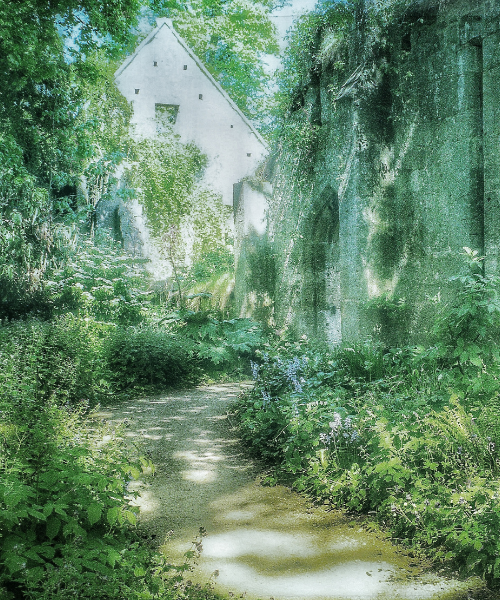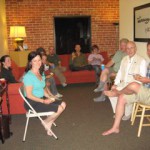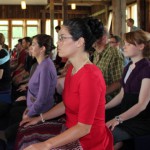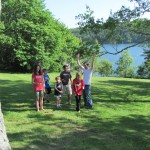Thursday
Buddhism, Psychedelic-Assisted Therapy and the Spiritual Path: An Interview with Dr. Sara Lewis
by Jillian Johnson
Register for the Buddhism, Psychedelic-Assisted Therapy and the Spiritual Path One-Day Retreat
One of the five main precepts in Buddhism is to avoid intoxicants, and it is clear that the use of substances can lead to spiritual bypassing. Yet many renowned practitioners in the West have talked openly about psychedelics as a catalyst to spiritual awakening that led them to the Dharma. Today, we sit down with Dr. Sara Lewis, co-founder of the Memoru Center for Visionary Healing Arts in Boulder, Colorado, and the Center for Psychedelic Studies at Naropa University, where she also served as an associate professor, and author of Spacious Minds: Trauma and Resilience in Tibetan Buddhism, to discuss the use of psychedelics in therapy and along one’s spiritual journey. In this interview, Sara provides us with her personal and professional perspective while considering how such practices may intersect, or not, with the Buddhist path.
Dr. Sara Lewis will hold an online mini-retreat, Buddhism, Psychedelic-Assisted Therapy and the Spiritual Path, through Shambhala Online on July 20, 2025. Click here to learn more and to register.
Jillian: Hi Dr. Lewis, thank you so much for being here with us today to share more about your work and knowledge in the field of psychotherapy and the implementation of psychedelics in mental health settings and spiritual pursuits.
Would you please tell us a little bit about your ‘why’ behind your work in mental health and how it expanded into the area of psychedelic-assisted therapy?
Dr. Lewis: I have long been interested in the mind: concepts of mind, the beauty and the challenges of the mind, and what it means to be human. As an anthropologist of religion and a psychotherapist, I am also deeply interested in how our connection to the divine changes across culture. In one way or another, I have been involved in the field of psychedelic studies for the last twenty years, yet it is more recent that psychedelic therapy has become more mainstream. As a Buddhist, I continue to see my clinical work as a skillful means to work with suffering in the world.
Jillian: How fascinating. We heard you opened a new clinic? Congratulations and please tell us more!
Dr. Lewis: Yes! Memoru Center for Visionary Healing Arts is a contemplative-based psychedelic training institute and community clinic where we offer legal psychedelic therapy. We can accept out of state clients who wish to travel to Colorado for a psilocybin experience. The Memoru clinic has a strong connection to Naropa University, where most of the cofounders have either worked as faculty or completed their studies.
Jillian: That’s very exciting, congratulations again! Speaking of legal psychedelic therapy, what do you feel are the current social and political climates surrounding the utilization of substances (primarily psilocybin and MDMA) in controlled mental health and spiritual settings? Are you noticing more or less acceptance in your typical day-to-day professional and personal interactions than in recent years?
Dr. Lewis: In general, there is a lot of interest and excitement for the therapeutic use of psychedelics. Many people understand that among veterans, abuse survivors, and others with PTSD, our standard treatments often fall short. As well, there is deep potential for plant medicines and psychedelics for those navigating the end of life. At Memoru, we will have a family program that aims to work with entire families–this might be when one person is at the end-of-life, navigating the post-partum period after birth, couples work, or a veteran returning home. When psychedelic care is done in a way that is slow, intentional and safe, I think there is significant support. At the same time, our basic health care infrastructure is not really set up to easily make this type of work accessible. Psychedelics do not fit easily into a capitalist system and without sounding too conspiratorial, the global Big Pharma system has many reasons to hinder the kind of paradigm shift many of us interested in psychedelic-assisted therapy are hoping for. Still, I believe that most of us yearn for change. With psilocybin now legal in various capacities in Oregon, Colorado and most recently, New Mexico, I believe in the next 5-10 years we will see a significant shift in accessibility of these modalities in North America and around the globe.
Jillian: Thank you so much for this thoughtful response, Sara. It is comforting to know that all areas of support are being explored for those seeking treatment and their families. Do you feel momentum and public support will eventually result in the integration of psychedelics into mainstream healthcare?
Dr. Lewis: Absolutely. And this could go the other direction as well if we do not take seriously the ethical responsibility to work with these medicines in a safe way. Many cultures across the world understand plant medicines to be living beings with sentience. They shouldn’t be “taken” in an extractive way. If we can relate with the cultures ethically who are stewards of these medicines, and collaborate and learn from them, I think we may have good results. For society as a whole to open up to them, I think we are in a critical period of needing to demonstrate that as a human society we can be trusted with these powerful agents. It’s up to us! But I feel the plants and fungi also want to help.
Jillian: I love your statement “…I feel the pants and fungi also want to help” and the care you show towards our Plantae and Fungi kingdoms. Have you noticed an increase in the number of patients and clients willing to consider psychedelics as part of their treatment plan for depression, anxiety, addiction, PTSD, etc.?
Dr. Lewis: Yes, very much so. Many people have earnestly tried conventional therapies without much relief. There are also many people seeking to work with suffering within the human condition in a way that honors and deepens their spiritual path. So there’s sort of a question about whether the work is “mental health work,” “spiritual work,” or something else. There is also a lot of joy, beauty and connection, something that may not be fully honored in a traditional treatment plan that tends to focus rather narrowly on the eradication of symptoms.
Jillian: It sounds like a very integrative approach that is catered to each individual’s unique needs and requirements, which is still lacking in many areas of healthcare. Would you tell us more about a situation(s) where the assistance of psychedelics, in a therapeutic application, aided a client in a breakthrough (mental, emotional and/or spiritual) that may not have occurred, or may have taken longer to occur, with more traditional mental health practices? Are you able to expand on the experience, at least from your perspective, and how that felt?
Dr. Lewis: I have had so many clients with intergenerational and ancestral experiences, even when they weren’t necessarily seeking that out. This has looked like deeply experiencing and seeing the ways that an ancestral burden has been passed down through the ages, visitations from elders who have passed, and sometimes a deep experience of connection and homecoming into one’s ancestral lineage. This happens so frequently that I myself, have embarked on a formal process of Ancestral Lineage Healing over the past year to better learn to work with my own spiritual lines. We will have more on this in the mini-retreat!
Jillian: This sounds not only incredibly interesting, but heart-warming as well. What a beautiful experience for both you and your clients. I am intrigued to hear more at the mini-retreat! In which situation(s) do you recommend someone not take psychedelics or partake in psychedelic-assisted therapy if it is a path they are interested in pursuing for their mental health and/or spiritual journey?
Dr. Lewis: These agents can be very powerful and it’s important to know if it’s the right time. I receive many referrals for people who have had negative even traumatic experiences resulting from psychedelics. Beyond contraindicated conditions like psychosis and mania (though even those who have these histories may be able to work in psychedelics under certain conditions), I wouldn’t recommend jumping into working with them if things aren’t stable enough to be able to accommodate potentially big and sometimes disruptive shifts. Sometimes these medicines work through disruption and dissolving: this could be to harmful patterns, misperceptions, ego-clinging, itself, or even the dissolving of relationships, career or other major disruptions.
Jillian: This is a very strong point to consider. Thank you for mentioning ‘being ready’ for shifts. While it is often said “The only constant change,” it is important to remember to be as grounded as possible before inviting a powerful catalyst for said change. What would you recommend as some of the “should” and “should nots” before holding a psychedelic session in terms of choosing an appropriate environment, monitoring one’s current mental state, integrating other practitioners and/or professionals, etc.? In a sense, what would you recommend in terms of setting yourself up for an enlightening experience?
Dr. Lewis: Most people do not need to work with a psychedelic therapist or clinician to have a safe and meaningful experience. This was recognized in the state of Colorado that has approved personal use of psilocybin mushrooms for anyone 21 years and over. Colorado also allows for individuals to embark on training as facilitators who do not hold a clinical license, again recognizing that many people can be trained to hold space for someone else ethically and with care. However, if the intention is really to engage in therapeutic work, it would be important to seek out a trained and licensed clinician. Sometimes it can be hard to really discern whether the work is “therapeutic” or whether it is “spiritual.” But this isn’t a new problem. Many cultures around the world do not separate the paths of healing and spirituality. What is most important is to feel that the setting and the practitioner is slow, intentional, and rooted in some kind of practice lineage. I would not get involved with anyone who doesn’t seem to have any mentors, elders, or community of accountability.
Jillian: Very true, consistent and quality integrative care that takes into account physical, mental, spiritual, and emotional health of an individual is a hurdle that seems to continually appear, at least in American culture. On a more casual note, if you were talking freely (perhaps in a bar) to a captivated audience, what would your elevator pitch be when introducing a metaphysical discussion on the topic of psychedelics in therapy or on one’s spiritual journey?
Dr. Lewis: I probably wouldn’t make one. A person really needs to feel the call, so to speak, on their own! If you listen and hear the call, however, many of us all across the globe would love nothing more than to dive into that conversation!
Jillian: What a conscientious approach. Wait for the invitation. And now for our final interview question, what has the use of psychedelics done for your personal spiritual growth? Do you have any stories you’re willing to share with us?
Dr. Lewis: Yes, but I will save these for the mini-retreat. Hope you can join!
Thank you, Sara, we’re looking forward to it! Myself and Shambhala Online thank you for taking the time to answer our questions about these exciting advances in patient/client care. You have touched on many dynamic aspects regarding the use of psychedelics in client care and we are eager to dive deeper on July 20!
Dr. Sara Lewis is Co-founder of Memoru Center for Visionary Healing Arts, a psychedelic clinic and training institute in Boulder, Colorado. She served as Associate Professor at Naropa University in Buddhist-Informed Counseling, where she also co-founded the Center for Psychedelic Studies. Sara is author of Spacious Minds: Trauma and Resilience in Tibetan Buddhism, an ethnographic study of mind, memory and recovery from collective trauma in the Tibetan exile community. She teaches in Shambhala on the topic of Buddhism and psychedelics, and has also served in a number of leadership roles, including a term on the Interim Shambhala Board.
Entries filed under Community Articles
An Introduction to Shambhala Culture: Awesome Like a Hot Dog – HIGHLIGHT
by Amanda Hester Adjutant Shambhala Office of Culture and Decorum An Introduction to Shambhala Culture is a handy little booklet newly published through Shambhala Media. It is presented by the Shambhala Office of Culture and Decorum. It is elegant, and orange, and it whispers ‘tiger’ at you. It is ... continuePosted July 26, 2012 by
A New Generation of Buddhists – HIGHLIGHT
by Lodro Rinzler, www.lodrorinzler.com Ten years ago, when I was an undergrad, I felt alone. I was known for two things around campus: the first was being a “hardcore” Buddhist and the second always being up for going out on the town with friends. I would drink, ... continuePosted July 25, 2012 by
Solitary Retreat and the Running Mind, part 2 – HIGHLIGHT
miksangpart 2 of Running with the Mind of Meditation on Solitary Retreat by Fay Octavia Elliott Where we left off: I heard Pema Chodron say once that the middle is always the hardest part of a retreat regardless of its length. I crossed the middle line this evening ... continuePosted July 21, 2012 by
A Summer Afternoon in Central Moscow – HIGHLIGHT
walking the streets,Shambhala Training in Russia by Leslie Witt, Shambhala Times Regional Correspondent Envision a lazy summer Sunday, teatime in Moscow, Russia. A flash of sunshine draws steam from rain-soaked sidewalks, playgrounds and hidden courtyard gardens. From the side door of a 50s-era apartment building emerge sun-dazzled meditators ... continuePosted July 20, 2012 by
All Ages and Abilities Have a Home in Shambhala! – HIGHLIGHT
This is the sixth in an ongoing series of articles on Aging in Shambhala. It is an interview with Mary Whetsell, Director of the Shambhala Office of Societal Health and Well-Being. Ms. Whetsell oversees the community-focused international working groups for the Shambhala mandala, including those dealing ... continuePosted July 17, 2012 by
Running with the Mind of Meditation on Solitary Retreat – HIGHLIGHT
miksangby Fay Octavia Elliott All joy in this world comes from wanting others to be happy, and all suffering in this world comes from wanting only oneself to be happy. ~ Shantideva The companion book I brought along on my first ever solitary retreat was Sakyong Mipham Rinpoche’s new book Running with ... continuePosted July 15, 2012 by
Fort Collins Shambhala Center Hosts SMC Evacuees
The Fort Collins Shambhala Meditation Center was a host center for nearly 20 Shambhala Mountain Center staff members who were part of a large group evacuated during the Colorado High Park fire near SMC this past June. The refugees (the group quickly renamed themselves ‘refugees’ — instead ... continuePosted July 11, 2012 by ann_reichhardt
Dear Rinpoche – HIGHLIGHT
Shambhala Retreat,poem compiled from aspirations by participants at the Being Brave Shambhala Retreat at Karme Choling with Sakyong Mipham Rinpoche: I have learned I am worthy of a spot on this earth and that all beings are worthy of a spot on this earth I have learned that I ... continuePosted July 2, 2012 by
Daddy’s Girl – HIGHLIGHT
by Maggie Scott While growing up, I was somewhat of a “daddy’s girl” and wanted to know that he was there for me. Like many men in my experience, Dad didn’t have a great deal of enthusiasm for expressing feelings. Or talking about personal problems. At the age ... continuePosted June 30, 2012 by
A Midsummer Night’s Donkey – HIGHLIGHT
Ladder-ball practice at Karme CholingCelebrating the Beginning of Summer Shambhala Centers and communities around the world celebrated the beginning of summer this last week with Midsummer Day. This sampling of stories and photos from around the mandala represents just a few of the events. Want to share ... continuePosted June 28, 2012 by
Midsummer: Halifax
Midsummers Day 2012 in Halifax was heralded by sunshine and a cool breeze. A rousing lhasang started off the day, followed by a picnic and children’s games. We further celebrated the day swinging, sashaying and do-si-do-ing with live contra dance band, Papilio, who sent us home ... continuePosted June 28, 2012 by
Midsummer: Atlanta and Boston
from Rhett Huber, Marketing and Communications at the Atlanta Shambhala Center photos by Andy Richard and Laura DeMercurio Here in Atlanta, we had a great Midsummer Day celebration. We enjoyed a parade with our little band after the lhasang ceremony, which was led by kasung members Harry Tate ... continuePosted June 28, 2012 by
Midsummer: Fredericton
by David Seabrook, Director of the Fredericton Shambhala Center On Sunday, June 17th, the Fredericton Shambhala Meditation Center celebrated its 10th Anniversary. Under a glorious blue sky, surrounded by a carefully-tended garden in bloom, our community of practitioners, along with family and friends, gathered to enjoy a morning ... continuePosted June 28, 2012 by
Midsummer: Casa Werma
from Craig Morman and Faith Killough, Co-Directors of Casa Werma in Patzcuaro, Mexico Here at Casa Werma in Pátzcuaro, Mexico, we invited neighbors and friends from Pátzcuaro and nearby villages to a potluck in celebration of the first day of summer. The day was a bit rainy ... continuePosted June 28, 2012 by
The Extraordinary Discovery of Ordinary Magic – HIGHLIGHT
AUTHOR CORRECTION: by Joe Mauricio, Director of the Baltimore Shambhala Center Coming upon a small bird building a nest the other day, I stopped and marveled at how simple and perfect my world was. Okay. That’s a fairly obvious observation. What made this particularly meaningful to me ... continuePosted June 11, 2012 by
![]() RSS feed for the Community Articles category
RSS feed for the Community Articles category
View all posts from authors in Community Articles: jillian_johnson

























